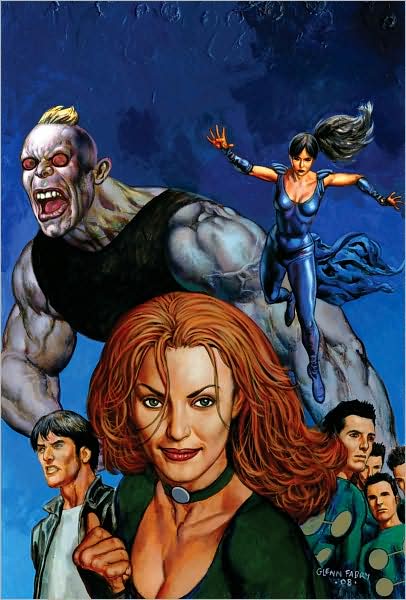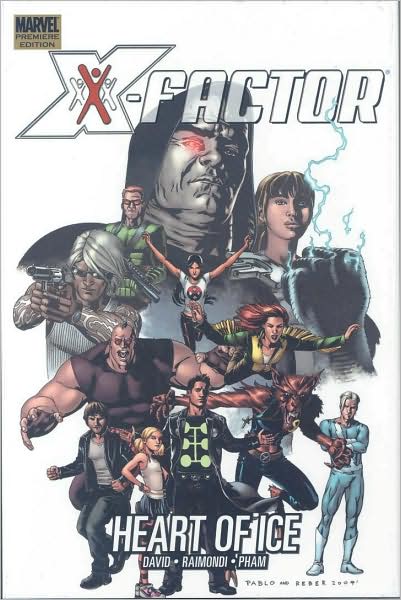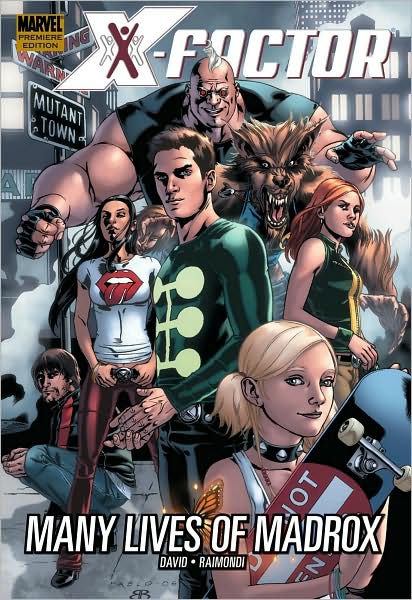 By Peter David and Pablo Raimondi
By Peter David and Pablo RaimondiCollecting X-factor 28-32, and The Quick and the Dead one shot.
The Lowdown:
X-factor struggles to find it's place and purpose, post Messiah Complex and suffers with the loss of two team members.
The Review:
Before reading this volume, I was very worried. I had heard that this series takes a terrible drop after the Messiah Complex. I can honestly say after reading this volume that, that is simply not true and if it is, it's certainly not an immediate drop.
In fact, this volume showcases some of Peter David's best work on the entire series. The first issue (#28) is absolutely fantastic and sets up the theme of dealing with loss of direction and building oneself back up in this volume.
The team lost two member during the Messiah Complex event, Layla Miller is stuck in the future in a mutant concentration camp, and Rahne has left to join X-force. These departures (one forced, one more voluntary) both have real consequences and Peter David makes a sucky situation into something that he can use. The first issue, and in a way this whole volume, deals with the team falling apart, hitting rock bottom, and pulling themselves out of the rubble. Layla Miller and Rahne were the heart and soul of this team, and Peter David makes it show, as the team barely holds together. Making things worse, Arcade, one of the most ridiculous villains in the X-verse, shows up to wreak havoc.
Peter David touches upon some interesting ideas here, first off, it's very obvious the team is falling apart and Madrox, surprisingly enough, is attempting to hold them all together. When Layla Miller arrived into the group, Madrox slowly grew into the leadership role, he was able to make tough decisions and take a stand, because Layla brought with her a sense of certainty about the future turning out alright. With her gone, Madrox lost his sense of confidence in the future, as Peter David makes clear, he lost hope because that certainty that everything would turn out okay was lost with her. Madrox, and the rest of the team recover a little bit by the end of this book, but it's still heartbreaking in the long run.
Rahne was the moral grounding, the faith of the team, and with her that is a bit lost. Speaking of Rahne, it makes no sense for her to go to X-force, yes she wants to avoid killing Madrox and Layla, but she's going to a place where she'll basically be used as a....Killer, considering the whole group is made up of pretty ruthless individuals. Anyways highly affected by this loss is Rictor, who was just starting a fling with Rahne. He seems to be hurt the most next to Madrox by the loss of his teammates. He has some very poignant scenes and seems to be greatly affected by the loss of Rahne as he questions his purpose on the team, and he questions his purpose in life. While everybody is doing that at this point in the series, but he seems to be doing it more because he is no longer a mutant.
Adding to the difficulty of the situation, you have a useless villain, Arcade, interfering in Mutant Town. Peter David picked Arcade for that reason, he's entirely ridiculous, it adds to the weight of the situation, it's like the cherry on top in a sense. He also inspires Madrox with a sense of purpose, and the reason he keeps going, because people like him who hate just to hate still exist whether there are 100 mutants, 1 million mutants, or just 10.
Again, a big meta plot of the survival of the mutant race, expertly entwined with X-Factor's small time drama.
The one-shot deals with hitting the bottom another way. It's entirely about Quicksilver and it's a great character study on a character who hit rock bottom. He's been bested by Layla Miller, he's been scorned by his father, he failed in protecting his sister, he failed in protecting the mutant race, he's assumed he was a vehicle for God's will and now it's all come back to him. It's not really a one-shot, as it's really part of a larger defining arc for the man. It's a fantastic story outside of the ending which I found a little silly.
Conclusion: Outside of a couple of wonky things, like Rahne's reasonings, the ending to the Quicksilver one-shot, and a couple of other things involving the villains of this series so far, it's a great volume and it may be the best one since the Longest Night.





